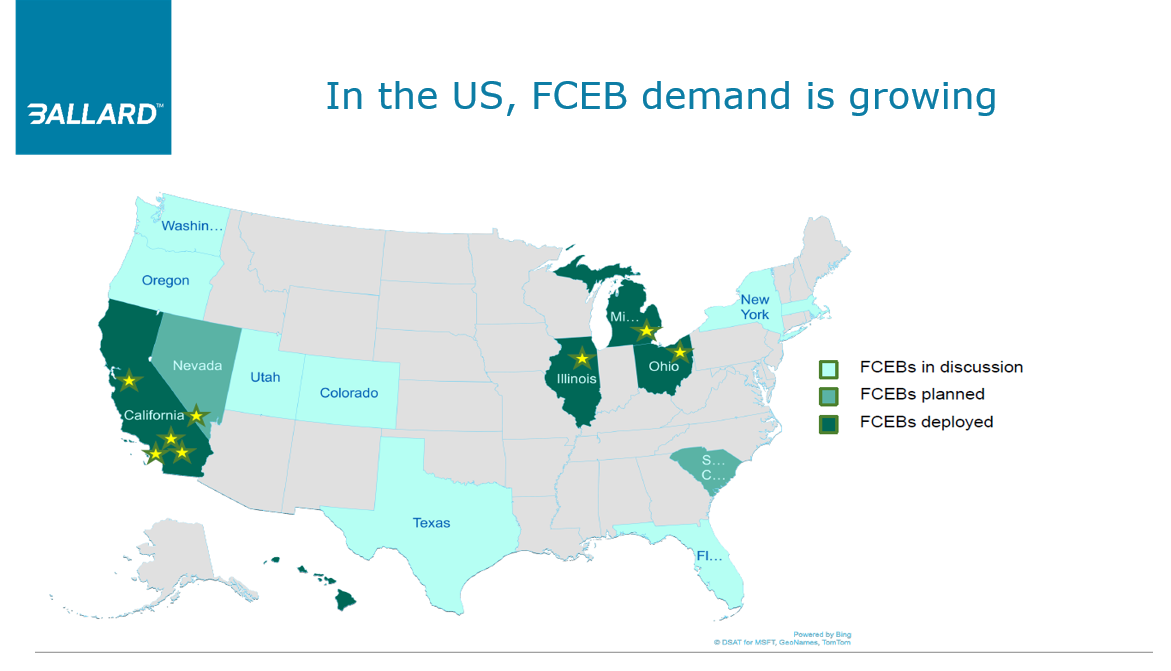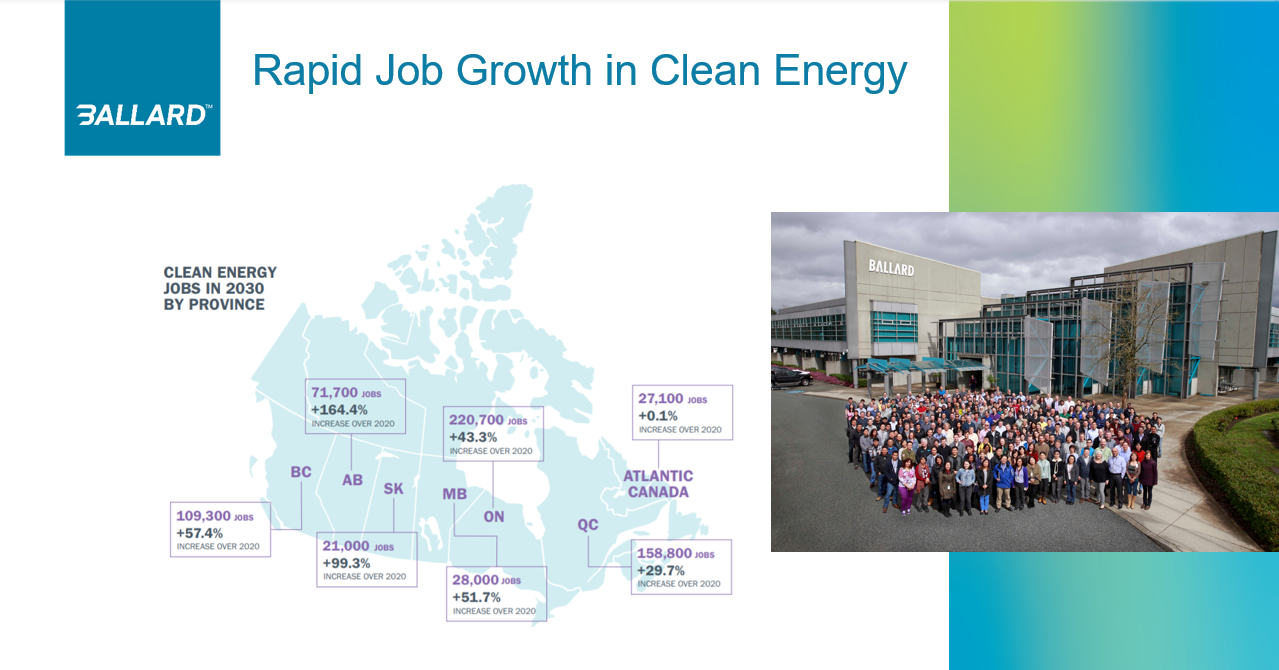
Globally, fuel cell electric buses (FCEBs) are increasingly preferred for one-to-one replacement of diesel and CNG buses. In North America, the US is leading the transformation to hydrogen-fueled zero-emission transit. Across the US, 64 FCEBs are in operation today. In large part, this is because of government policies and studies which looked at scaling up of zero emission bus deployments to fleet size.
In Canada, new zero-emission policies and funding are helping the country make up for lost time. Several provinces have made their first FCEB purchase commitments, and interest is growing.


Mandates are Key
Currently, 127 countries, including Canada and the US, have adopted or are considering nationwide net-zero targets. These countries, combined, represent 63% of the world’s GHG emissions. Canada has also joined a group of countries in making more specific commitments that target medium- and heavy-duty vehicles.
In Canada:
- By 2030, 30% of new medium- and heavy-duty vehicle sales will be zero-emission
- By 2040 100% of new medium- and heavy-duty vehicle sales will be zero-emission
This commitment is already affecting how transit authorities plan their future fleets.
California’s Innovative Clean Transit Regulations Point the Way
California’s Innovative Clean Transit (ICT) regulation has been highly effective in encouraging zero-emission bus (ZEB) rollouts across the state. It goes beyond setting purchasing guidelines—it legislates that, by 2040, all transit buses on the road in California must be zero-emission.
In California:
- By 2023, 25% of new bus purchases must be ZEB
- By 2025, 50% of new bus purchases must be ZEB
- By 2029, 100% of new bus purchases must be ZEB
- By 2040, all 10,000 transit buses in California must be ZEB
To support the transition, funding has increased. The US Federal Government has doubled their Low-No grants for ZEBs over the past two years. Last year, four awards for FCEBs have totalled almost $15M, the most significant funding to date.
The Federal Transit Administration (FTA) offers grants through their 5339 Bus and Bus Facilities Funding; for 2022, they have dedicated preferential awards for ZEBs (from the annual $447M in funding).

Fuel Cells Thrive in Canada’s Climate
For transit systems operating in Canada, fuel cell systems’ superior winter performance is critical. FCEBs can operate from -40 to +50 C, and their range and hill-climbing ability is largely unaffected by winter conditions.

In Canada demand for FCEBs is building:
- Alberta will soon have Ballard-powered New Flyer FCEBs on the road
- Cities in Manitoba, Ontario, and PEI are planning FCEB deployments
- Cities in Quebec and Saskatchewan are now looking at FCEBs as an option for ZEB
.png?width=3281&name=Fuel%20Cell%20Bus%20Deployment%20Canada%20(1).png)
The factors driving this interest are many:
- FCEBs are commercially available today
- Total cost of operation (TCO) is competitive with other zero emission transit alternatives
- Hydrogen’s higher energy density (compared to batteries) enables longer routes, longer operating hours, heavier payloads and higher hotel loads
- Only FCEBs have a similar range to diesel and CNG buses, allowing one-to-one replacement with no change to routes or service
- Fast refueling (vs. slow battery charging) means higher uptime and more service hours and less depot process disruption
- Fuel cell infrastructure is scalable, enabling faster deployment and gradual fleet growth
FCEBs and battery electric buses (BEBs) can easily be combined to create a 100% zero-emission fleet, with each technology performing where appropriate. While the TCO of fuel cell buses is already competitive, costs are expected to drop as fuel cell vehicle fleet deployments grow.
FCEB Performance
- Range: 500+ kilometers (up to 350 miles)
- Fuel consumption: < 8 kilograms/100km
- Fuel cell stack durability: > 25,000 hours (proven in service)
- Fuel cell maintenance cost: <$0.10/km
- Fuel cell module availability: 97%
- Operating temperatures -40 to +50 degrees C (ambient temperature)
- Freeze start from -25 degrees C
Clean Energy Powers Canada’s Economic Growth
Hydrogen fuel cell technology is a gateway to job growth and entrepreneurship across Canada. In heavy duty transportation alone, there is the potential for one million new jobs by 2030— skilled, well-paid technical and professional jobs—in a clean, future-oriented industry.

The clean energy sector overall is a current and future economic engine:
- BC - 2000+ potential jobs in sustainable technologies
- Alberta - wind power employment is projected to increase by 22%
The first hydrogen-powered heavy duty transportation deployments are underway
- Saskatchewan - the hydrogen technology cluster is expected to grow by 24%
- Manitoba - construction of energy-efficient buildings is growing by an average of 4.6% annually
- Ontario - clean energy, industrial growth, greenhouse gas control technology sectors are growing by 17% per year
- Quebec is investing in clean technology, industrial growth, and hydrogen production for transport and wind power
- Atlantic Canada has seen 90% growth in renewable energy, hydrogen production, and low carbon machinery

Hydrogen Ecosystem Is in Place and Expanding
Across Canada, hydrogen fuel is widely available. Renewable hydrogen options are entering the market, and advancements in hydrogen conversion are adding to the renewable possibilities. In every province, low-carbon hydrogen can be produced using local resources, with GHG impacts that are the same or better than electricity.
Reasons to Prefer Hydrogen for ZE Buses
- Predictable operating costs: hydrogen’s price per kg is easy to budget: it remains the same in every season
- Mature, competitive local supply chain: Canada’s hydrogen’s supply chain is proven, with a competitive infrastructure and a range of fuel suppliers
- Fully scalable infrastructure: Refueling depots can serve from five to 100+ buses, with minimum incremental CAPEX investment as fleets grow
- Lower risk: many fuel service providers offer turnkey supply contracts, including operation and maintenance. Long-term supply agreements can include equipment financing
- Faster deployment: Liquid hydrogen and compressed hydrogen delivery options do not require off-site infrastructure investment (power substation, new power lines, recharging infrastructure)
- Further reduction of operating costs: As hydrogen demand and production increase, price is expected to drop below parity with diesel
New Funding for ZE Transit
As the American experience has shown, zero-emission transit grows in response to funding and legislative support. As noted above, Canada has signed on to international agreements requiring zero-emission medium- and heavy-duty vehicles. The Federal Government’s new Investing in Canada Plan backs that up with $20.1 billion in funding for public transit. The Federation of Canadian Municipalities also offers grants for municipal environmental projects.
Funding Opportunities:
Ballard: Your Partner in Fuel Cell Transportation
In technology and experience, Ballard leads the hydrogen fuel cell industry. At Ballard, we have worked with transit operators, transit authorities, vehicle OEMs and many others in developing hydrogen fuel cell solutions adapted to transit. We offer consultation, workshops and training for anyone planning to deploy a fleet and/or develop the associated infrastructure, and our sales staff can assist with tendering processes.

It’s time to increase the number of fuel cell electric buses on Canada’s roads powered by Canadian technology. At Ballard, we’re ready to partner with transit agencies and OEMs across the country who will take the lead on transitioning Canada’s transit systems to zero-emission.